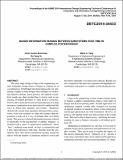| dc.contributor.author | Austin-Breneman, Jesse | |
| dc.contributor.author | Yu, Bo Yang | |
| dc.contributor.author | Yang, Maria | |
| dc.date.accessioned | 2017-05-02T13:14:33Z | |
| dc.date.available | 2017-05-02T13:14:33Z | |
| dc.date.issued | 2014-08 | |
| dc.identifier.isbn | 978-0-7918-4640-7 | |
| dc.identifier.uri | http://hdl.handle.net/1721.1/108563 | |
| dc.description.abstract | The early stage design of large-scale engineering systems challenges design teams to balance a complex set of considerations. Established structured approaches for optimizing complex system designs offer strategies for achieving optimal solutions, but in practice sub-optimal system-level results are often reached due to factors such as satisficing, ill-defined problems or other project constraints. Twelve sub-system and system-level practitioners at a large aerospace organization were interviewed to understand the ways in which they integrate sub-systems. Responses showed sub-system team members often presented conservative, worst-case scenarios to other sub-systems when negotiating a trade-off as a way of hedging their own future needs. This practice of biased information passing, referred to informally by the practitioners as adding “margins,” is modeled with a series of optimization simulations. Three “bias” conditions were tested: no bias, a constant bias and a bias which decreases with time. Results from the simulations show that biased information passing negatively affects both the number of iterations needed to reach and the Pareto optimality of system-level solutions. Results are also compared to the interview responses and highlight several themes with respect to complex system design practice. | en_US |
| dc.description.sponsorship | National Science Foundation (U.S.). Graduate Research Fellowship Program | en_US |
| dc.language.iso | en_US | |
| dc.publisher | American society of Mechanical Engineers | en_US |
| dc.relation.isversionof | http://dx.doi.org/10.1115/DETC2014-34433 | en_US |
| dc.rights | Article is made available in accordance with the publisher's policy and may be subject to US copyright law. Please refer to the publisher's site for terms of use. | en_US |
| dc.source | American Society of Mechanical Engineers (ASME) | en_US |
| dc.title | Biased Information Passing Between Subsystems Over Time in Complex System Design | en_US |
| dc.type | Article | en_US |
| dc.identifier.citation | Austin-Breneman, Jesse, Bo Yang Yu, and Maria C. Yang. “Biased Information Passing Between Subsystems Over Time in Complex System Design.” Volume 7: 2nd Biennial International Conference on Dynamics for Design; 26th International Conference on Design Theory and Methodology (August 17, 2014). | en_US |
| dc.contributor.department | MIT Institute for Data, Systems, and Society | en_US |
| dc.contributor.department | Massachusetts Institute of Technology. Department of Mechanical Engineering | en_US |
| dc.contributor.department | Massachusetts Institute of Technology. Engineering Systems Division | en_US |
| dc.contributor.mitauthor | Austin-Breneman, Jesse | |
| dc.contributor.mitauthor | Yu, Bo Yang | |
| dc.contributor.mitauthor | Yang, Maria | |
| dc.relation.journal | Volume 7: 2nd Biennial International Conference on Dynamics for Design; 26th International Conference on Design Theory and Methodology | en_US |
| dc.eprint.version | Final published version | en_US |
| dc.type.uri | http://purl.org/eprint/type/ConferencePaper | en_US |
| eprint.status | http://purl.org/eprint/status/NonPeerReviewed | en_US |
| dspace.orderedauthors | Austin-Breneman, Jesse; Yu, Bo Yang; Yang, Maria C. | en_US |
| dspace.embargo.terms | N | en_US |
| dc.identifier.orcid | https://orcid.org/0000-0001-7891-1187 | |
| dc.identifier.orcid | https://orcid.org/0000-0002-7776-3423 | |
| mit.license | PUBLISHER_POLICY | en_US |
